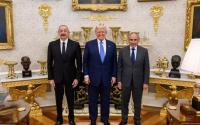Published on Monday, January 31, 2005 by International Herald Tribune
by William Pfaff
ROME -- The Iraq insurgency is many things, but above all it is anti-American and nationalist.
The U.S. command in Baghdad still does not reliably know the composition of the insurrection. It variously describes it as "regime-remnants," ex-Baathists, foreign jihadists, criminals, "dead-enders," or members of Al Qaeda led by Abu Musab al-Zarqawi. All these are self-serving formulations for U.S. domestic political use. The important issue is what would happen to the insurgency in an Iraq that had regained its independence.
The political process the United States started with Sunday's election is to conclude with the Iraqis governing themselves. There is an unacknowledged factor in this promise: The United States is already unable to govern Iraq.
The United States and its allies have become the victims of the chaos they provoked. It is the insurgency that now holds the strategic and tactical military initiative in that unhappy country.
There has been an implicit political ascendance by the Iraqis as a whole over an American occupation, which long ago lost its way. Thus, while the national and constitutional assembly elected on Sunday to replace the interim government might end badly, it might also end in an Iraqi government of national union that demands that America and its coalition leave.
The illusions of Washington's view of the crisis were evident in the Senate confirmation hearings of Secretary of State Condoleezza Rice. Rice repeatedly said that 120,000 Iraqi soldiers and police officers had already been trained to replace coalition troops. This is a number chosen for public consumption, but it is also taken seriously inside the ideological hothouse where the administration's Iraq decisions have been made. At the hearing, Senator Joseph Biden, who had just been in Iraq and has a serious grasp of military matters, said the number is 4,000.
Accounts by recent witnesses of life inside the Baghdad Green Zone tell of feverish bargaining for power in a new postelection government. At the same time, U.S. military commanders acknowledge that no Iraqi province is secure outside the Kurdish north - and that things are not entirely secure even there.
The coalition forces themselves are victims of an adventure that has been predicated since the start on fictions about Iraq and weapons of mass destruction, fictions about American interest and motives, fictions about the nature of the resistance, fictions about American successes and fictions about the elections.
The truth would seem to be that Iraq's affairs will not finally be decided by popular elections but by the consensus of the elders of a society whose authority structures remain mainly tribal. It is not a nation of political individualists.
A conclusion to be drawn from this is that Iraq is not anxious for civil war, notwithstanding the way certain domestic U.S. political interests, anxious to perpetuate the American presence in the country, exploit the fear of such a threat. Even if the elections had seen mass participation by eligible voters and totally secure polls, the newly elected assembly would not possess the final word concerning a new constitution. (The assembly will oversee drafting a constitution, under which new parliamentary elections will be held in December, 2005.)
Leaders of the Shiite majority have already said that they have no intention of installing a clerical government, and that they understand the need for Sunnis and the other groups to participate in the constitutional process. Sunni tribal and clerical leaders have themselves indicated that they intend to have their say in writing the new constitution, whatever the result of the present election. As reported in The New York Times, the basic law approved last March gives Sunnis enormous influence over the constitutional process.
The law says that a new constitution must be submitted to a national referendum, and would be invalidated by rejection in three provinces. This was written to give the Kurds a veto over an unacceptable constitution, but it gives the Sunnis the same veto.
Pre-electoral violence in Iraq was directed against the occupation and against presumed American control over the constitutional process. The traditional leaders of Iraq's social and religious forces can contain it if the United States gets out.
That is why a new assembly is going to demand a timetable for U.S. withdrawal. Giving them that timetable is essential to peace in Iraq, and to the larger interests of the United States now and in the future.






